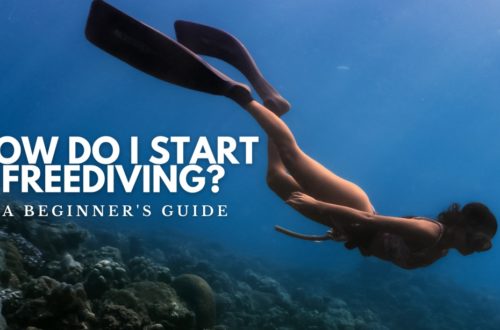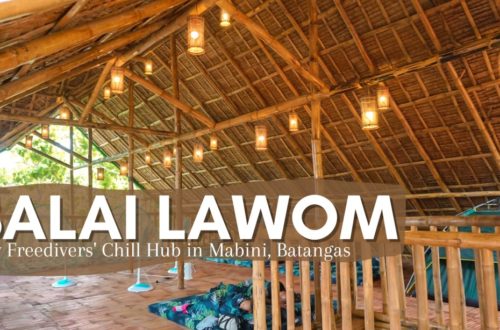
What to Do After an Open Water Course?
Before the holidays, I decided to visit Siquijor and further my diving skills and knowledge through certification in both freediving and scuba diving. After years of exploring the ocean, I’ve finally decided to take a certification on scuba diving.
The PADI Open Water course had several skills sets that made it both challenging and fun for me. This full entry level certification allowed me to safely dive down to 18 meters without an instructor’s supervision, learn more and set up my own diving kit or equipment, plan and log my dives, perform basic self and buddy rescue drills, navigation, use the dive computer and more.

After coming home fresh from the certification, I asked myself, “What now?”
To give you an idea, here are some essential answers to the question, “What to do after an Open Water course?”
What Now After the Open Water course?
Do Fun Dives

The Open Water course equips you with a solid set of skills and knowledge, but it’s through frequent diving—especially fun dives—that you can truly hone and perfect these abilities. With each dive, you’ll not only improve your technique but also deepen your appreciation for the ocean, uncovering new dive sites and encountering a variety of marine life. Every dive offers a chance to refine your skills while exploring diverse underwater landscapes. Along the way, you’ll meet fellow divers, building connections that could turn into lasting friendships and future dive adventures together. The more you dive, the more confident and capable you’ll feel, making each experience more enjoyable and rewarding.
Invest in Gear

Purchasing your own diving equipment is a great option if you dive frequently and value the comfort of using gear that fits your personal preferences. Owning your gear ensures it’s always ready when you are, and offers the advantage of hygiene and a custom fit that rented equipment may lack. However, if you only dive occasionally or travel often, renting equipment might be more practical and cost-efficient. It provides access to well-maintained, high-quality gear without the need for storage, upkeep, or the hassle of transporting it, especially if you’re diving in various destinations. Ultimately, whether you buy or rent depends on how often you dive and your priorities in terms of convenience versus long-term investment.
Take an Advanced Open Water Course

I thoroughly enjoyed spending time, breathing at the depths. It gave me an opportunity to observe and immerse myself in the underwater world. This fueled my eagerness to explore further and deeper. However, I soon realized that the Open Water certification comes with limitations. The dives I’m eager to explore require a higher level of knowledge and skills to ensure both my safety and that of the ocean’s. I decided to put off investing in new gear for the time being and focus on advancing my skills instead. That’s when I chose to take my certification to the next level — the Advanced Open Water certification.
Why I Decided to Pursue an Advanced Open Water course
Dive Deeper with Confidence

One of the main reasons I decided to pursue the Advanced Open Water certification is because it allows me to dive safely and deeper — up to 30 meters (100 feet). This allows me to explore exciting dive sites that were previously out of reach (especially with an Open Water certification), such as sunken wrecks, dramatic drop-offs, vibrant coral reefs, and unique underwater landscapes.
If you’re planning to dive in renowned locations like Puerto Galera, which sits within the biodiverse Verde Island Passage, the Advanced Open Water certification is essential. The dive sites in Puerto Galera are famous for their incredible marine life, and the deeper dives in the area offer a chance to see species and ecosystems that require more advanced skills to explore safely.
Refine Diving Skills



The Advanced Open Water course isn’t just about diving deeper; it’s about becoming a more skilled, self-sufficient diver. Through the course, you’ll focus on different skills, including underwater navigation, buoyancy control, and emergency procedures. You’ll also learn about new types of diving like wreck, night and drift diving and how can you do it safely.

I chose to take the course at Casalay Boutique Villas & Dive Resort in Puerto Galera, and it turned out to be the perfect decision. The peaceful environment and experienced instructor allowed me to focus on improving my skills in a safe, comfortable setting. With small groups and personalized guidance, I had ample opportunities to refine my technique and build more confidence underwater.
Explore a Variety of Specialties

The Advanced Open Water course includes a range of Adventure Dives, offering you the chance to explore different diving disciplines such as Deep Diving, Underwater Navigation, Wreck Diving, Night Diving, and Peak Performance Buoyancy.


These dives not only enhance your skills and build confidence but also act as a gateway to more specialized courses, like Wreck Diving, Night Diving, Underwater Photography and more. What makes the course even better is the flexibility to choose the dives that interest you most, allowing you to customize your learning experience while laying the groundwork for more advanced and niche dive certifications in the future.
Gain more Independence and Safety

The Advanced Open Water course helps you grow into a more responsible and independent diver. It teaches you how to assess dive sites more effectively, understand the risks, plan your dives based on your skill level, and manage both your air consumption and dive time efficiently. Most importantly, it emphasizes diving with the safety of both yourself and others as a top priority.
What to Do After an Open Water Course, in a Nutshell
Your journey beyond the Open Water course can take several directions, depending on your goals. If you’re eager to expand your knowledge and improve your skills, you might consider advancing through additional certifications, such as Advanced Open Water or specialty courses, which offer more opportunities for exploration and deeper understanding of diving techniques. On the other hand, if you prefer to keep things simple and focus solely on enjoying the underwater world without committing to further education or an investment, that’s perfectly fine too.

Regardless of the path you choose, the most important aspect of your diving experience is that you enjoy each dive to the fullest while always prioritizing safety. Remember, diving is meant to be a rewarding and fun activity, whether you’re progressing as a diver or simply enjoying the freedom of the ocean. Always dive within your comfort zone, and take the necessary precautions to ensure your safety and that of those around you.
Where I took my Advanced Open Water Course



One of the reasons I chose Siquijor for my Open Water course was because I wanted to spend hours lounging at a laid-back beach after a day of diving. I thought I’d like to do the same for my Advanced Open Water course, so I thought of island and dive destinations nearby my hometown that has the same vibe somehow. Puerto Galera crossed my mind. Having tried freediving in Puerto Galera there myself, I can attest that it’s truly an ideal diving destination, especially since it’s located within the Verde Island Passage. The island is also fringed with stunning beaches, though some can get crowded with tourists. I then searched for beachside dive resorts that weren’t as busy, and that’s when I found the perfect place to do it all — Casalay Boutique Villas & Dive Resort.




